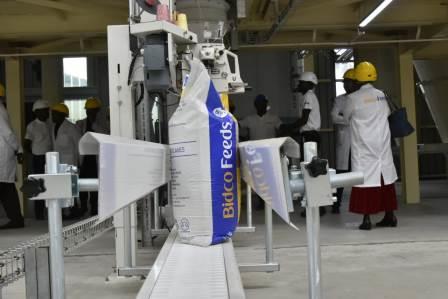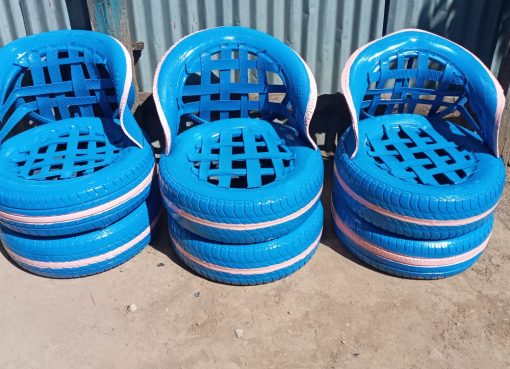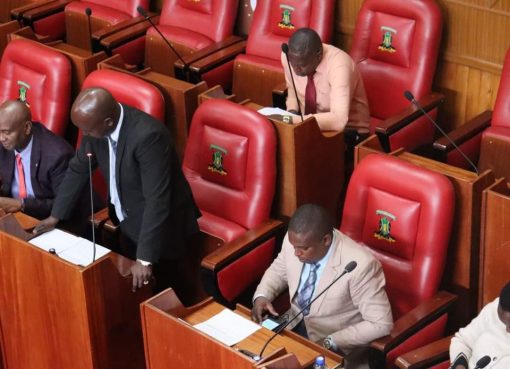Nakuru County’s quest to reclaim its yesteryear’s status as a vibrant commercial and industrial hub has received yet another boost after consumer goods producer BIDCO Africa Group unveiled a Sh1.2 billion ultra-modern animal feeds manufacturing plant at the Town’s Industrial Area.
BIDCO’s move comes barely three months after another multinational animal feeds maker Maxim Agri International, set up a Sh1 billion factory at the Oserian Two Lakes Industrial Park in Naivasha.
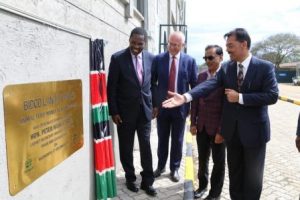
Oserian Two Lakes Industrial Park that sits on 750 acres of land is owned by Oserian Development Company renowned worldwide for flower farming.
Trade, Industry and Cooperatives Cabinet Secretary (CS), Peter Munya, observed that the new flow of local and foreign investments into Nakuru was being aided by the County’s location, good infrastructure, affordable power from Menengai and Olkaria geothermal plants, the upcoming airport in Lanet and the Standard Gauge Railway (SGR) now connecting Naivasha and the Mombasa Port.
The Cabinet Secretary said he had gazetted 404.7 hectares (1,000 acres) in Mai-Mahiu within Naivasha Sub-county as a Special Economic Zone as industrialization is the driving force for any economy.
The planned construction of the Naivasha Industrial Park and Dry Port, he said have raised the profile, and will open up Nakuru as a commercial hub in East African region.
“No County has grown without industrialization. This is why the Government has prioritized the manufacturing sector under the Big Four Agenda. With its agricultural hinterland, Nakuru County is a major source of raw materials for industries. Geographically, the town is centrally located in relation to the rest of the country and is therefore more accessible,” stated the Cabinet Secretary.
He noted that the BIDCO, the latest entrant into Nakuru’s manufacturing sector would create more than 500 jobs directly and 5,000 indirectly from new 160,000 metric ton per year capacity factory, throughout the value addition and distribution chain.
“We want other devolved units to emulate Nakuru whose administration continues to formulate policies that promote the competitiveness of local industry, encourage value addition and diversity of locally manufactured products. County Assemblies need to enact legislations that protect and encourage investors,” added Mr Munya.
Kenya Association of Manufacturers (KAM) South Rift Chairman, Jayen Dodhia, described the entry of the factories as a pointer to Nakuru becoming the second most preferred investment destination in the country after Nairobi.
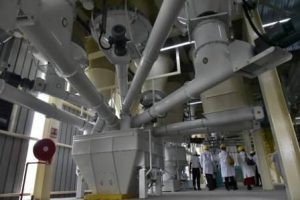
Dodhia added that the upcoming factories have an opportunity to shine and succeed if they produce products of unmatched quality to beat competition from plants based in other cities.
A recent survey on the Gross County Product by the Kenya National Bureau of Statistics had stunning revelations to the effect that Nakuru is the second biggest economy after Nairobi, ahead of bigger cities of Mombasa and Kisumu.
The County’s 6.1 percent contribution to the economy, second to Nairobi’s 21.7 percent may rise further following ongoing and planned industrial developments expected to create more wealth and employment opportunities.
Governor Lee Kinyanjui, said his Administration has been developing policies and enacting laws that have made it profitable for local companies to export again, boosting their capacity to expand within the country while focusing on growth and productivity of Small Medium Enterprises.
“We have been working with other agencies in both National and County government and the private sector to facilitate potential investors through the establishment of a one-stop desk where they are issued with all the required documentation. We have in place deliberate and predictable policy interventions.
We are also exploring direct use of steam from Africa’s largest geothermal power plants at Menengai and Olkaria for small and medium level agricultural enterprises as an initial step towards setting up of cottage industries,” said the County boss.
Kinyanjui said continued improvement of road infrastructure including construction of two interchanges along the Nairobi-Nakuru-Eldoret and the proposed SGR line to Naivasha will ease transportation to and from the County, which he said is vital for industrialization.
“We also invite investors to take advantage of the 1,000 acres of land in Satellite along the Mai Mahiu- Suswa Road that has been gazetted as an industrial zone,” said Mr Kinyanjui.
The turn-round of fortunes is a great relief to scores of jobless residents and sharply contrasts with 1990s when major industrial concerns either collapsed or relocated to other towns rendering thousands of residents jobless.
The County once hosted mega industries such as Coca Cola’s flamingo bottlers, dry cell manufacturer, Nakuru Oil Mills, Savanna Saw Mills, the once giant Unga Group, and Milling Corporation of Kenya among others.
Major industrial concerns that either collapsed or relocated from Nakuru include East Africa Industries, ABC Foods and Elliots Bakeries Limited which exited scene in 1994, Eveready Dry Cell Manufacturers which folded in 2015 following influx of cheap battery imports from China and the pre-independence Kabazi Canners that was a major livelihood for farmers and residents of Subukia and Bahati Sub-counties.
Flamingo Bottlers and Sam-Con Limited, a steel-body fabricating company that held a franchise for Isuzu trucks moved their operations to Nairobi.
The situation was further complicated when key government agencies such as Agricultural Development Corporation farms (ADC), Pyrethrum Board of Kenya (PBK), Kenya Farmers Association, Kenya Planters Cooperative and Kenya Railways either scaled down operations or collapsed.
Maxim General Manager, Muhammad Salman, said the firm expected to start operations in January 2021 will directly offer employment to over 200 people and will also be involved in genetic modification, cow comfort products and farm equipment aimed at improved breeds and production and higher returns for farmers.
“Our ultimate aim is to create about 30,000 indirect jobs through the production and value addition chain. Our focus is to produce quality feed geared towards improving productivity of the beef, maize, poultry and pig subsectors,” said Salman.
BIDCO’s Chief Executive Officer, Vimal Shah, said the firm has engaged 35,000 farmers across the country to supply them with soya and sunflower produce and was looking to increase the number to 70,000 following opening of the Nakuru plant.
“This, in essence is what we are trying to achieve as a nation, a manufacturing sector that links with other productive sectors of the economy for Kenya to achieve its Big Four Agenda and Vision 2030 goals, our approach towards the manufacturing sector has to change. It must be business unusual,” said Mr. Shah.
Last year, Sameer Agriculture and Livestock Limited pumped into the county Sh.3 billion in its newest factory a few kilometers from Salgaa Trading Center.
The Company’s National Sales Manager, Rajesh Mishra, said the Company was producing three milk variants; full cream, whole milk and low fat milk and different juices.
Apart from providing employment to hundreds of youths, the plant has provided a market for milk from local dairy farmers who are yet to meet its demand.
Nakuru Deputy Governor, Dr Eric Korir, observed that strategic location, land availability, improved infrastructure, friendly tax regimes and legislations and reliable supply of raw materials and labour were among factors that were attracting investors back to the devolved unit.
“We have incorporated Public-Private Partnerships in setting up key projects such as the Oserian Industrial Park, KenGen Textile City Park, Lord Egerton Agri-City, and Kabarak University Smart City,” explained the Deputy Governor.

The devolved unit, he said, was also keen on ensuring that the Naivasha Industrial Park creates thousands of employment opportunities as well as boost industrial development.
Among the manufacturing concerns that have seized the opportunity to set shop in Nakuru include Royal Group Industries which has pumped Sh800 million on a steel factory whose construction is ongoing at a 22 acre piece of land.
The Company’s Director, Yusuf Hassanali, said the project is targeting to offer employment opportunities and market its products within Rift Valley and Western Kenya regions.
“We settled for Nakuru as it is centrally located. Most steel and iron sheet manufacturers are domiciled in Nairobi and Mombasa. We want to fill the void that has been there in western parts of the country.
The investment targets to contribute to the Big Four Agenda on housing by cutting down on costs of transporting building materials,” said Hassanali.
The factory which will be producing steel bars of between 8 and 32 millimeters thickness will engage at least 300 employees at the plant and thousands others in the supply chain.
For the first time, the devolved unit will be hosting a cement manufacturing concern after Devki Group of Companies rolled out construction of its factory in Salgaa area.
The company commands over twenty percent of the cement market locally through its flagship Simba Cement brand. It has also cultivated a reputation in the East African region through exports.
Egerton and Kabarak Universities have joined the fray by setting up industrial parks and agro-cities that will offer raw materials and employment to local residents while at the same time providing market for their produce
By Anne Mwale and Mark Wayne


